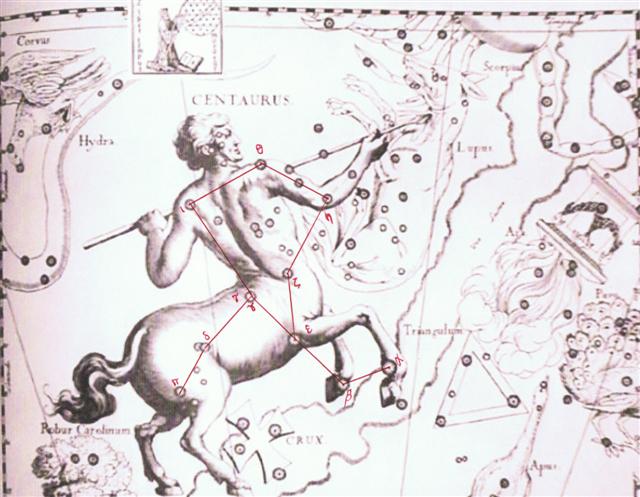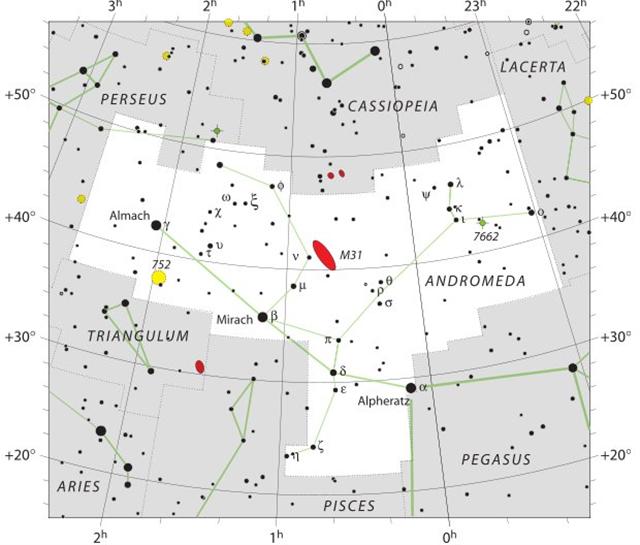The Head of the Fly is the first star in the
Bharani station and a similariy in meaning
between the star Bharani and Cih in the lap of Cassiopeia can easily be imagined:
|
ARIES: |
|
1 |
Ashvini |
β and γ Arietis |
Horse's head |
April 17 (107) |
|
wife of the Ashvins |
Sheratan and Mesarthim |
|
2 |
Bharani |
35, 39, and 41 Arietis |
Yoni, the female organ of
reproduction |
May 1 (121) |
|
the bearer |
Musca Borealis |
From April 17 to May 1 there were
121 - 107 = 14 days. 14 * 71 = 994 and 76 B.C. -
994 = 1070 B.C.
From Cih to The Head of the Fly there were 39 -
12 = 27 days:
|
8 |
'March 3 |
4 (63) |
|
March 30 |
31 |
 |
 |
|
Ca1-9 |
Ca1-10 |
|
DELTA
(8.4), Schedir (8.6), μ Phoenicis (8.9) |
ξ
Phoenicis (9.0), ρ Tucanae (9.1),
DENEB KAITOS,
η Phoenicis (9.4) |
|
'March 5
(64) |
6 |
7 (432) |
|
April 1
(91) |
2 |
3 |
 |
 |
 |
|
Ca1-11 |
Ca1-12 |
Ca1-13 |
|
ACHIRD
(10.7) |
ρ
Phoenicis (11.2),
η
ANDROMEDAE
(11.4) |
CIH, λ
Tucanae (12.4) |
|
26 |
'April 3 |
4 (460) |
5 (95) |
|
April 30 |
May 1
(121) |
2 |
 |
 |
 |
|
Ca2-14 |
Ca2-15 |
Ca2-16
(42) |
|
μ
Arietis (39.4),
Head of
the Fly
(39.6), Kaffaljidhma (39.8) |
ο
Arietis (40.0),
Angetenar (40.2),
Right
Wing
(40.9) |
π
Arietis (41.2),
BHARANI
(41.4), τ² Eridan, σ Arietis (41.7) |
|
29 |
In the times of Al Sharatain there
was evidently a child
(tamaiti) at day 460 + 1.
216 = 3 *
72 = 6 * 36 = 12 * 18 = 432 / 2.
432 ('March
7) was the position of Cih.
Bharani
rose 29 days after Cih. Which means Bharani rose at spring equinox
29 * 71 = 2059 precessional years earlier than Cih. 1070 B.C. + 2059
= 990 A.D.
Below I have added nakshatra stars:
|
8 |
Side a |
|
'March 3 |
4 (63) |
5 |
6 |
7 (432) |
|
March 30 |
31 |
April 1
(91) |
2 |
3 |
 |
 |
 |
 |
 |
|
Ca1-9 |
Ca1-10 |
Ca1-11 |
Ca1-12 |
Ca1-13 |
|
DELTA
(8.4), Schedir (8.6), μ Phoenicis (8.9) |
ξ
Phoenicis (9.0), ρ Tucanae (9.1),
DENEB KAITOS,
η Phoenicis (9.4) |
ACHIRD
(10.7) |
ρ
Phoenicis (11.2),
η
ANDROMEDAE
(11.4) |
CIH, λ
Tucanae (12.4) |
|
ρ Virginis (191.4),
PORRIMA, γ Centauri
(191.5) |
ι Crucis (192.2), β
Muscae (192.5), Mimosa (192.9) |
no star listed (193) |
κ Crucis (194.4), ψ
Virginis (194.5), μ Crucis, λ Crucis (194.6), Alioth
(194.8) |
Minelauva (195.1), Cor
Caroli (195.3) |
It should be noted that from
Rei in Ca1-11 to the silent moa in
Cb1-11 there are 366 + 26 = 392 glyphs,
not 366 + 27 = 393 days. 403 - 11 = 392.
Assuming side b may
have been
meant to illustrate the situation on Easter
Island, where spring arrived not with the March equinox but the
September equinox, it seems reasonable to use the same
calendar as north of the equator but to change the connection
with the stars so that instead of a heliacal view it was a
lunar (nakshatra) view. Therefore I have bluecoloured the stars
which could be observed close to the Full Moon beyond the
September equinox.
From η
Andromedae (close to her left elbow) to η Centauri
(at his right elbow) there were 220.4 - 11.4 = 209.0 days, and
209 - 183 = 26.

Andromedae's left elbow was at
ζ, a star which I have not
yet listed. But now I am curious to learn the distance from ζ to
η:

Furthermore, M31, the great Andromeda
nebula, should be inserted in my list.
"... the Great Nebula, the Queen of the Nebulae,
just northwest of the star ν,
is said to have been known as far back as A.D. 905; was
described by Al Sufi as the Little Cloud
before 986; and appeared on a Dutch star-map of 1500."
(Allen)
|
M31 |
00h42m42.00s |
42.700m |
7.7 |
|
ζ
Andromedae |
00h47m20.30s |
47.338m |
8.9 |
|
η
Andromedae |
00h57m12.40s |
57.207m |
11.4 |
For
the moment I was unable to reach Wikipedia and therefore I used
Cartes du Ciel instead.
|
7 |
'March 2 |
3 (428) |
4 (63) |
|
March 29
(88) |
30 (455) |
31 |
 |
 |
 |
|
Ca1-8 |
Ca1-9 |
Ca1-10 |
|
M31
Andromedae
(7.7) |
DELTA
(8.4),
Schedir
(8.6),
ζ
Andromedae,
μ Phoenicis (8.9) |
ξ
Phoenicis (9.0), ρ Tucanae (9.1),
DENEB KAITOS,
η Phoenicis (9.4) |
Also
in the constellation of the 'Cavalry Officer' (Centaurus)
its star ζ arrives before η,
and 220.4
- 210.3 = 10 days.
|
Manacle |
ziqq |
Phoenician zayin |
 |
Greek zeta |
Ζ (ζ) |
|
...
Zeta (uppercase
Ζ,
lowercase ζ;
Greek:
ζήτα
... is the sixth letter of the Greek alphabet.
In the system of Greek numerals, it has a value
of 7. It was derived from the Phoenician letter
Zayin. Letters that arose from zeta
include the Roman Z and Cyrillic
З
...
Zayin
(also spelled Zain or Zayn or
simply Zay) is the seventh letter of many
Semitic abjads ... It represents the sound
[z]. The Phoenician
letter appears to be named after a sword or
other weapon. (In Biblical Hebrew, 'Zayin'
means sword, and the verb 'Lezayen' means
to arm. In modern Hebrew, 'zayin' means
penis and 'lezayen' is a vulgar term
which generally means to perform sexual
intercourse and is used in a similar fashion to
the English word fuck, although the older
meaning survives in 'maavak mezuyan'
(armed struggle) and 'beton mezuyan'
(armed, i.e., reinforced concrete). The
Proto-Sinaitic glyph according to Brian Colless
may have been called ziqq, based on a
hieroglyph depicting a 'manacle'. |
|
Egyptian courtyard |
 |
Phoenician heth |
 |
Greek eta |
Η (η) |
|
... The letter
shape ultimately goes back to a hieroglyph for
'courtyard' ... possibly named
hasir in the Middle Bronze Age alphabets,
while the name goes rather back to
hayt, the name reconstructed for a letter
derived from a hieroglyph for 'thread'
 |
|
Equinox |
'March 22 (81) |
23
(448) |
24 |
|
'September 20 |
21
(264) |
Equinox |
23 |
|
April 17 (107) |
18 |
19
(475) |
20 |
|
October 17 |
18 |
19 |
20
(293) |
 |
 |
 |
 |
|
Cb1-1 (393) |
Cb1-2 |
Cb1-3 |
Cb1-4 |
|
E tupu - ki roto |
o te hau tea |
ki te henua - te maro |
|
ANA-NIA |
Al
Sharatain-1 /
Ashvini-1 /
Bond-16 |
ι Arietis (28.0), λ
Arietis (28.2) |
Alrisha, χ Phoenicis
(29.2), Alamak (29.7)
Alkes
|
|
POLARIS,
Baten Kaitos
(26.6), Metallah (26.9) |
Segin,
Mesarthim, ψ
Phoenicis (27.2), SHERATAN,
φ Phoenicis (27.4) |
|
no star listed (209) |
Muphrid (210.1),
ζ
Centauri
(210.3) |
φ
Centauri (211.0), υ¹ Centauri (211.1), υ²
Centauri (211.8), τ Virginis (211.9) |
Agena (212.1), θ Apodis (212.5), Thuban (212.8) |
|
'March 25 |
26 (85) |
27 (452) |
rutua - te pahu - rutua te
maeva - atua rerorero - atua hiko ura - hiko
o tea - ka higa te ao ko te henua ra ma te
hoi atua |
|
'September 24 |
25 (268) |
26 |
|
April 21 (111) |
22 (478) |
23 |
|
October 21 |
22 (295) |
23 |
 |
 |
 |
|
Cb1-5 |
Cb1-6 (398) |
Cb1-7 |
|
κ Arietis
(30.3), Hamal (30.5) |
η Arietis
(31.9) |
no star
listed (32) |
|
χ Centauri (213.0),
Menkent (213.1) |
Neck-2 |
Al Ghafr-13 /
Svāti-15
TAHUA-TAATA-METUA-TE-TUPU-MAVAE |
|
Asellus Tertius,
κ VIRGINIS,
14 Bootis (214.8) |
15 Bootis (215.2),
ARCTURUS
(215.4), Asellus Secundus (215.5),
SYRMA,
λ Bootis (215.6), η Apodis (215.8) |
|
'March 28 |
29 |
30 (455) |
31 (90) |
|
'September 27 |
28 |
29 |
30 (273) |
|
April 24 |
25 |
26 (116) |
27 |
|
October 24 |
25 |
26 |
27 (300) |
 |
 |
 |
 |
|
Cb1-8 |
Cb1-9 |
Cb1-10 |
Cb1-11 (403) |
|
θ Arietis
(33.3), Mira (33.7) |
no star listed
(34) |
ξ Arietis
(35.0) |
no star listed
(36) |
|
ι Lupi, 18 Bootis (216.3), Khambalia
(216.4), υ Virginis (216.5), ψ Centauri
(216.6), ε Apodis (216.8) |
Asellus Primus (217.8)
Fomalhaut
|
τ Lupi (218.1), φ Virginis (218.7) |
σ Lupi (219.1), ρ Bootis (219.5), Haris
(219.7) |
|
'April 1 (91) |
2 |
3 (459) |
|
'October 1 (274) |
2 |
3 |
|
April 28 |
29 |
30 (120) |
|
October 28 (301) |
29 |
30 |
 |
 |
 |
|
Cb1-12 |
Cb1-13 (405) |
Cb1-14 |
|
manu rere - kua rere ga
manu - ki te ragi |
eaha te nuku erua |
koia kua huki |
|
no star listed
(37) |
ν Arietis
(38.5) |
μ Arietis
(39.4), Head of the
Fly (39.6), Kaffaljidhma (39.8) |
|
σ Bootis (220.2),
η Centauri
(220.4) |
ρ Lupi (221.0), Toliman (221.2), π Bootis
(221.8), ζ Bootis (221.9) |
31 Bootis (222.0), Yang Mun (222.1), Rijl al
Awwa (222.5), ο Bootis (222.9) |
|
'April 7 |
8 (464) |
9 (99) |
|
'October 7 (280) |
8 |
9 |
|
May 4 (490) |
5 (125) |
6 |
|
November 3 |
4 (308) |
5 |
 |
 |
 |
|
Cb1-18 |
Cb1-19 (411) |
Cb1-20 |
|
manu moe ra |
ki to mata |
e nuku mata |
|
ρ Arietis
(43.0), Acamar (43.6), ε Arietis (43.7)
|
Menkar (44.7) |
Algol (45.9) |
|
Ke Kwan (226.3), Ke Kwan (226.4), Zuben
Elakribi (226.8) |
Nadlat (227.8), π Lupi (227.9) |
Zuben Hakrabim
(228.3), λ Lupi (228.9) |
|
'April 10 (100) |
11 |
12 (468) |
13 |
|
'October 10 |
11 |
12 (285) |
13 |
|
May 7 |
8 |
9 |
10 (130) |
|
November 6 (310) |
7 |
8 |
9 |
 |
 |
 |
 |
|
Cb1-21 (413) |
Cb1-22 |
Cb1-23 |
Cb1-24 |
|
hoea |
ko te rima |
kua oo ki te vai |
ma te ua |
|
Misam
(46.2), Botein (46.9) |
ζ Arietis
(47.7) |
Zibal (48.0) |
τ Arietis
(49.7) |
|
ι Librae (229.6), κ Lupi (229.7), ζ Lupi
(229.8) |
Al Zubānā-14b |
μ Lupi, γ Tr. Austr. (231.3) |
ο Cor. Borealis (232.0), δ Lupi
(232.1), φ¹, ν² Lupi (232.2), ν¹ Lupi
(232.3), ε Lupi (232.4), φ² Lupi
(232.5), Pherkad (232.6), η Cor.
Borealis (232.8), υ Lupi (232.9) |
|
χ Bootis (230.2), χ Bootis (230.3),
Princeps (230.6),
ZUBEN
ELSCHEMALI
(230.8) |
Above I have pushed the stars 1
position ahead in order to be together with the
glyphs (and dates). But the right ascension hour
information is no longer there, because this
refers to the time of rongorongo and not to the
times of Al Sharatain. The 'longitudinal'
grid of right ascension is constantly
moving.
Stars which culminated at
midnight, for instance Fomalhaut in October 25
(298), I have for the moment left untouched, not
moved 1 position ahead. Possibly, though, also
they should be pushed 1 day forward.
|



















